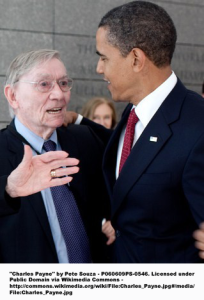Although my father entered Buchenwald on the fifth day of  Passover, his pictures and the stories written on the backs of them do not talk about the holiday of liberation. However, this story from Israel’s Ch. 7 relates much of what Dad must have experienced and raises a new question: Did my father meet Charlie Payne? Charlie, then a 20 year old soldier, was to become the great uncle of president Obama! Sadly. Mr.Payne died in 2014, another hero who now will never get to see my Dad’s pictures or offer his comment’s because of the determination of my brother Hugh Schwartz to “let them rot!”
Passover, his pictures and the stories written on the backs of them do not talk about the holiday of liberation. However, this story from Israel’s Ch. 7 relates much of what Dad must have experienced and raises a new question: Did my father meet Charlie Payne? Charlie, then a 20 year old soldier, was to become the great uncle of president Obama! Sadly. Mr.Payne died in 2014, another hero who now will never get to see my Dad’s pictures or offer his comment’s because of the determination of my brother Hugh Schwartz to “let them rot!”
Like my Dad, Charlie Payne returned with what we would now call post traumatic stress disorder. President Obama said that when his uncle returned home, “he just went up into the attic and he didn’t leave the house for six months. Now obviously something had really affected him deeply but at that time there just weren’t the kinds of facilities to help somebody work through that kind of pain.”
There were no facilities for my Dad either. Worse, our part of Boston was then very anti-Semitic and my Dad was threatened that he would be beaten. I still have the “head knocker” cane Robert brought back from Germany and used to threaten the thugs who gathered on our street one night as my father took his evening walk. These thugs ran away from this tough and frightening Jewish ex US Army medic. Despite this toughness, my father would sometimes wake up at night screaming.
My Dad also talked about his knowing what was happening to the Jews, even though it was not until April 1945 that Stars and Stripes finally published articles about Nazi atrocities and concentration camps, and even then, the articles did not mention Jews. The average GI reading Stars and Strips had no way of knowing that Jews were the main victims of the Nazis. As the artist Arthur Sztyk said, Europe’s Jews were being “treat[ed] as a pornographical subject–you cannot discuss it in polite society.”
Now, 70 years later, my siblings want my father’s pictures to rot.
.
Death Camp Liberated Pesach 1945
Dr. Rafael Medoff. Arutz Sheva, Channel 7
Israel National news
edited to bring the date to today and to condense the text.
70 years ago this week, On April 4, 1945, the first day of Passover, the 4th Armored Division and the 89th Infantry Division came across
Ohrdruf, a sub-camp of Buchenwald, as they chased the retreating German army. The Nazi guards had already abandoned the camp and forced most of the prisoners to take part in a death march. They left behind piles of emaciated corpses.
Eight days later, General Dwight Eisenhower, together with Generals George Patton and Omar Bradley, visited Ohrdruf. Eisenhower was so disturbed by what he encountered that he arranged for several delegations of journalists and Members of Congress to view the evidence of Nazi atrocities first hand. “The things I saw beggar description,” he wrote. “The visual evidence and the verbal testimony of starvation, cruelty and bestiality were so overpowering as to leave me a bit sick.”
1944 –six months before Mr. Obama’s great-uncle entered Ohrdruf– Sgt. Paul submitted an article about the mass murder of the Jews in Auschwitz, The editors of Yank turned it down, saying it was “too Semitic.” They told him to rewrite it so that it “did not deal principally with Jews.”


Private property. Public responsibility. These historic photos should belong to humanity, to the world, and above all, to the victims.
I hope the judge in Mass. agrees,